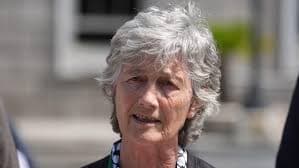Ireland Stands Poised To Elect Its Most Anti-Israel President Yet
Catherine Connolly’s long history of anti-Israel rhetoric has alarmed Jewish leaders already dismayed by the outgoing president.

Ireland, whose current president has made comments likening the war in Gaza to the Holocaust, looks set to elect a leader whose views are even more hostile to Israel.
The favored candidate to win Friday’s election — and bring to an end the 14-year tenure of President Michael D. Higgins — is Catherine Connolly, a far-left politician running as an independent. Recent polls show her with a commanding 18-point lead, driven by her anti-establishment stands on a range of issues.
For many members of the Jewish community, Mr. Higgins’s departure will come as a relief. The outgoing president has placed himself at odds with Ireland’s Jewish leaders over the course of his incumbency, and especially in recent years, by embracing anti-Israel rhetoric and downplaying concerns over rising antisemitism in the country.
Now, though, Jews in Ireland are grappling with the possibility that he will be replaced by Ms. Connolly, who, much like her predecessor, holds hardline views on Israel that have drawn accusations of antisemitism.
Ireland’s former justice minister, Alan Shatter, for one, told Jewish Insider that if Ms. Connolly is elected, she will “present as Michael D. Higgins on steroids.”
Ms. Connolly’s criticisms of Israel in light of its war in Gaza have been central to her campaign, though her anti-Israel activism predates Hamas’s October 7, 2023, attack.
The Irish politician made waves in 2021 when she used the term “Jewish supremacy” to refer to Israel’s treatment of the Palestinians. The comment, which invokes a classic antisemitic trope, was denounced by the Jewish Representative Council of Ireland and sparked a campaign for her to be disciplined.
The backlash did little to diminish Ms. Connolly’s use of anti-Israel rhetoric, however. Between 2021 and 2025, Ms. Connolly brought up the Jewish state in parliament over 200 times, often branding Israel a “terrorist state” or “an apartheid regime.”
During the war in Gaza, she has repeatedly accused Israel of committing genocide against the Palestinians, though she refuses to assign the same label to Hamas’s October 7 massacre. She has also pushed for harsher sanctions on Israel in protest of the war.
Ms. Connolly took things a step further last month when she defended Hamas’s right to govern a potential Palestinian state, stating that the terror group is part of “the fabric of the Palestinian people.”
Beyond Israel, the far-left figure has made controversial comments about NATO, including blaming the alliance for the Russian invasion of Ukraine. She has also questioned Ireland’s relationships with America and the European Union, saying the two entities “certainly cannot” be trusted.
The role of the president in Ireland is largely ceremonial, with the primary function being to represent the Irish people at home and on the world stage. Even so, Ms. Connolly’s critics worry about what her potential electoral victory may signal about the country.
“It says we are not a serious people,” writes a former political adviser within the Irish parliament, Daniel Epstein-O’Dowd. “To the detriment of our people and national priorities, we obsess over a foreign nation. We lecture Israel and America on security, when our government struggles so much as to put a plane in the sky or a ship in the sea.”
Mr. Epstein-O’Dowd, who examines whether Ms. Connolly is “worse than Michael D. Higgins” in an op-ed for the Times of Israel, reckons that “Connolly is the candidate who confirms our hubris, but if she follows on from Higgins, Ireland will be the poorer for it.”

